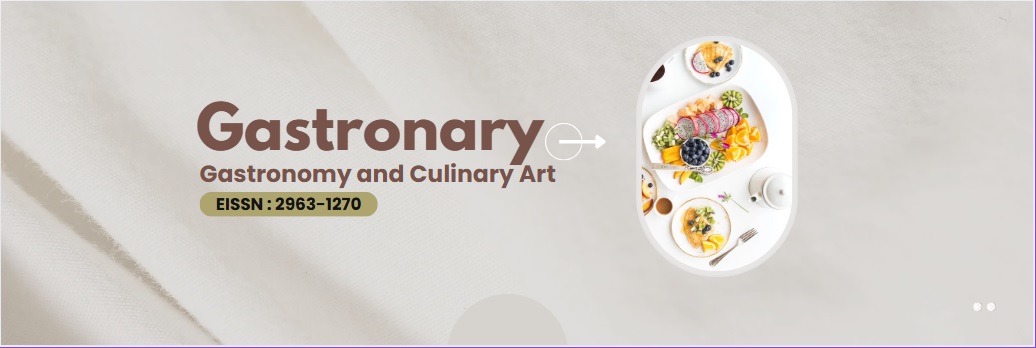Experiments in Processing Castengel with Tempe Flour as a Substitute Wheat Flour
DOI:
https://doi.org/10.36276/gastronomyandculinaryart.v2i2.509Keywords:
Experiment, Tempe Flour, Kastengel, food InnovationAbstract
kastengel is a dry cake made from wheat flour. Wheat flour contains a protein called gluten. However, there are some people who cannot consume gluten, so a substitution of wheat flour is needed. Tempe is a food made from soybeans which does not contain gluten, so tempeh can be processed into flour to replace wheat flour. The use of tempe flour as a substitute for wheat flour will certainly be healthier, because it is free of gluten. In addition, tempeh is affordable and can add variety to the processing of tempeh. This study with 30 respondents aimed to find out whether tempe flour could be used as a raw material in processed kastengel cakes and to determine the preference level of tempe flour kastengel based on aspects of taste, aroma, color and texture. The analytical method used is the hedonic test with 4 levels of assessment (Very Like, Like, Dislike, Strongly Dislike) and also uses a sensory test. Data analysis was carried out through questionnaires and interviews with respondents. From the results of the hedonic test and sensory test, the taste aspect gets the Very Like category with an average value of 3.8; the color aspect and the texture aspect get the Very Like category with an average value of 3.7; and the aroma aspect gets the Like category with an average value of 3.47. Based on the results of the study, it can be concluded that tempeh castor flour can be used as the basic ingredient for making kastengel and is preferred by respondents based on aspects of taste, aroma, color and texture.
References
Maulina, A. (2015). Eksperimen Pembuatan Cake Subtitusi Tepung Tempe.[Skripsi]. Jurusan Pendidikan Kesejahteraan Keluarga. Fakultas Teknik. Universitas Negeri Semarang. http://lib.unnes.ac.id/22908/1/5401410139.pdf
Bambang Kartika et all, 1988. “Pedoman Uji Inderawi Bahan Pangan”. Pusat Antar Universitas Pangan dan Gizi. Gadjah Mada University Press. Yogyakarta.
Budi Sutomo, 2008. Sukses Wirausaha Kue Kering. Jakarta: Kriya Pustaka.
Dhevina Widhia Afrisanti, 2010. “Kualitas Kimia Dan Organoleptik Nugget Daging Kelinci Dengan Penambahan Tepung Tempe”. Skripsi. Fakultas Pertanian, Universitas Sebelas Maret. https://digilib.uns.ac.id/dokumen/detail/17218
Bastian, F., Ishak, E., Tawali, A. B., & Bilang, M. (2013). Daya terima dan kandungan zat gizi formula tepung tempe dengan penambahan semi refined carrageenan dan bubuk kakao. Jurnal Aplikasi Teknologi Pangan, 2(1). http://jatp.ift.or.id/index.php/jatp/article/view/91/60
Anwar, H. M., Faridah, A., Hasnur, Y., Syarief, W., & Budiarti, A. P. (2021, April). Substitution Of Corn Flour On The Quality Of Dry Choux. In The 3rd ICCFBT 2020. http://iccfbt.fpp.unp.ac.id/index.php/iccfbt2020/iccfbt_2020/paper/viewPaper/330
Aryanta, I. W. R. (2020). Manfaat tempe untuk kesehatan. Widya Kesehatan, 2(1), 44-50. https://doi.org/10.32795/widyakesehatan.v2i1.609
Manurung Gerhard et all, 2014. Pelatihan Usaha Tempe Tahu. Jakarta: Amerta Publishing
Hidayah, N. L., & Anna, C. (2019). Pengaruh Substitusi Tepung Tempe dan Penambahan Margarin terhadap Mutu Organoleptil Kue Kembang Goyang. e. Jurnal Tata Boga, 8, 23-31. https://core.ac.uk/download/pdf/230743712.pdf
Sugiyono, 2010. Metode Penelitian Kuantitatif Kualitatif dan R & D. Bandung: Alfabeta
Turmuktini, T. (2009). Interaksi Antara Dosis Fungi Mikoriza Arbuskula Terhapat Pertumbuhan, Kuantitas, dan Kualitas Tiga Kultivar Kedelai. Berk. Penel. Hayati Edisi Khusus C, 3, 79-83. http://berkalahayati.org/files/journals/1/articles/348/submission/348-1110-1-SM.pdf
Downloads
Published
How to Cite
License
Copyright (c) 2023 Linda Putri Inggriyanita, Enny Mulyantari Mulyantari, Hermawan Prasetyanto

This work is licensed under a Creative Commons Attribution-ShareAlike 4.0 International License.






